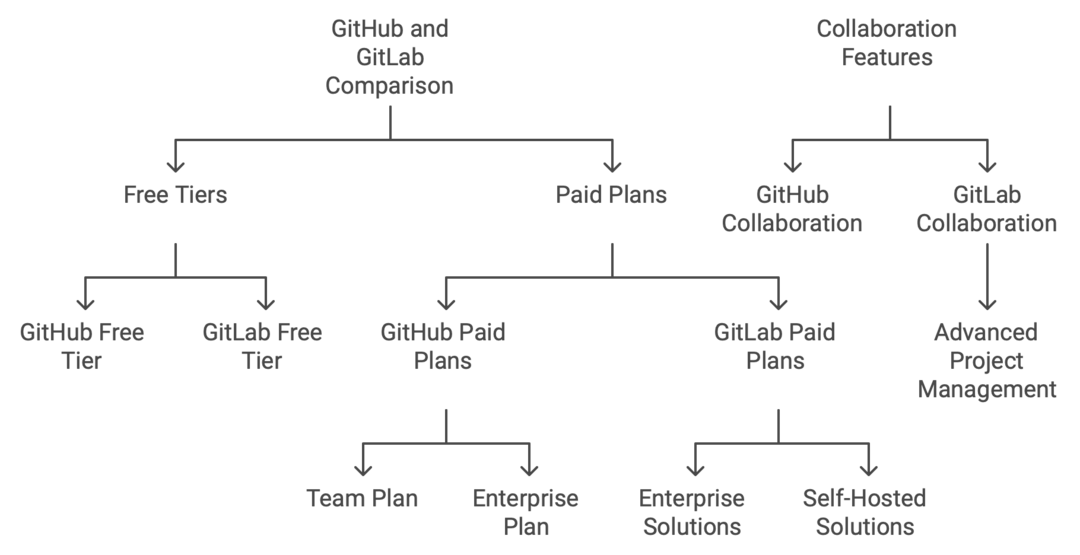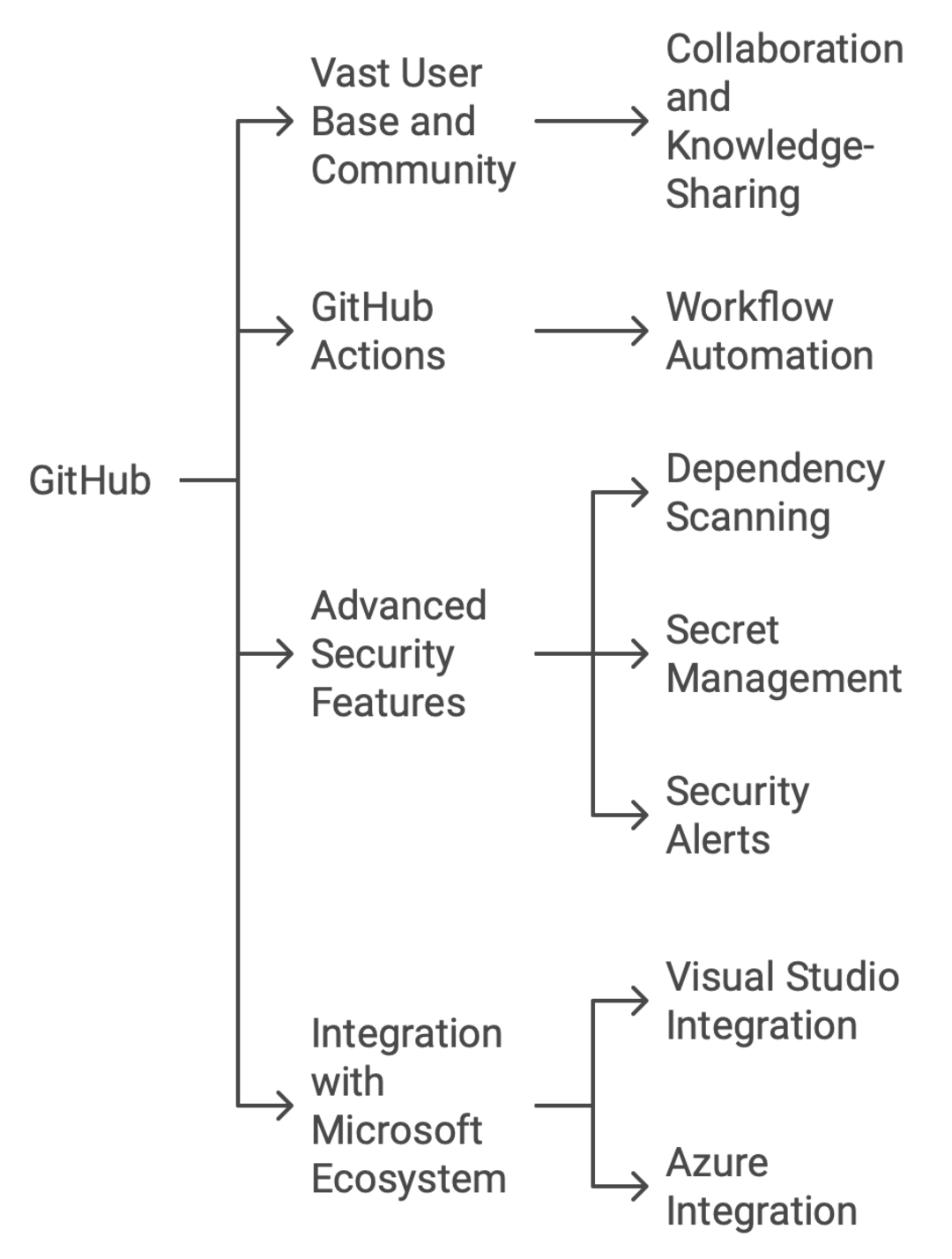In software development, the right version control platform is vital. It can make a big difference in collaboration. Two giants stand out in this arena: GitLab and GitHub offer powerful tools that improve workflows, project management, and team collaboration. But, they do so in unique ways. Whether youre an indie developer or in a large firm, know the nuances between these platforms. Theyre important. It will help you make informed decisions.
What Are The Main Differences between GitHub and GitLab?
GitLab and GitHub are both popular version control platforms. But, they serve different needs. GitHub is known for its vast community and open-source project hosting. It offers an intuitive interface that appeals to developers of all levels. GitLab has a more integrated approach. This makes it a favorite among teams looking for an all-in-one solution. Performance varies. Users often report faster load times on GitLab due to its self-hosting. These differences can greatly affect your workflow, based on your needs and preferences.
Version control system features
Both GitHub and GitLab have strong version control features. They cater to various developer needs. GitHub excels with its user-friendly interface and extensive community support.
- Version Control: GitLab offers robust version control, including branching, merging, and commit history for efficient collaboration.
- Integrated DevOps: GitLab provides a full suite of DevOps tools, from code management to deployment, within a single platform.
- Streamlined Workflows: Features like merge requests and issue tracking ensure efficient teamwork and code reviews.
- Centralized Documentation: GitLabs built in wiki allows teams to document projects and knowledge directly within the platform.
Both platforms emphasize security as well. They provide options like protected branches and access controls. They ensure that only authorized users can make changes. It often depends on project needs and a preference for user experience.
Project management capabilities
When it comes to project management, GitHub and GitLab each have unique strengths. Git Hub offers a streamlined interface that integrates seamlessly with its issue tracking system. Users can create issues, assign tasks, and label them for better organization.
Both platforms support collaboration through comments on issues and merge requests. If you need advanced project tracking and Agile workflows, GitLab may be better. Each tool meets different needs. They depend on how you manage projects in your development cycle. The best code generation LLM can automate repetitive tasks, accelerate development, and enhance code quality.DevOps integration options
DevOps integration is crucial for streamlining workflows and improving collaboration. Both GitHub and GitLab offer robust options, but their approaches differ. GitHub integrates seamlessly with a variety of third-party tools through its extensive marketplace.
Users can connect to popular CI/CD services, like Travis CI or CircleCI. This will automate testing and deployment. Its an easy way to do it. This flexibility allows teams to tailor their DevOps pipeline according to specific needs. GitLab has built-in features. They simplify DevOps integration, right out of the box. Its built-in CI/CD tools mean less reliance on external ones.
Teams enjoy a unified experience from code creation to deployment without switching platforms. Choosing between the two platforms depends on your teams preference. Do you want customization or a tailored, all-in-one solution for development?
How Do GitHub and GitLab Compare in Terms of Pricing and Plans?
When weighing GitHub and GitLab, pricing is a significant factor. Both platforms offer free tiers with varying features tailored to different user needs. GitHubs offer free plan allows unlimited public repositories but limits private repositories. Its perfect for smaller projects or those looking to showcase their work. Both platforms offer enterprise solutions for organizations needing strong infrastructure and support. Each service tailors its pricing to specific needs. So, users must find the best fit for their workload and collaboration goals.

Free tier offerings
Both Git Hub and GitLab have great freetiers. They are accessible for individuals and small teams. GitLab also offers built-in DevOps tools in their free package. This attracts those wanting to streamline their workflows from coding to deployment.
Choosing between these platforms often comes down to specific needs. They may be for open-source development or for private project management. So, understanding these offerings can help you decide.
Paid plans and enterprise options
Git Hub and GitLab both offer a range of paid plans tailored to different needs. GitHub has several tiers, including Team and Enterprise Cloud.
The Team plan has advanced collaboration features. The Enterprise plan has strong security and compliance options. For larger enterprises looking for self-hosted solutions, both platforms provide dedicated enterprise options. This lets teams control their codebase. It also allows for workflow-specific integrations.
When choosing a platform for your organization, consider the budget and the features. They should align with your teams goals.
Which Platform Offers Better Collaboration and Workflow Features?
Collaboration is key to software development. Both GitHub or GitLab have unique features to improve team workflows. Both platforms support comments and tagging teammates in discussions. But, GitLabs project management features can help workflows. They have boards like Kanban systems. Integrations matter too. Both platforms support third-party apps. But, each has a marketplace for specific needs. These collaboration features cater differently to various team dynamics and preferences. Software development projects require meticulous organization, effective communication, and seamless collaboration.
Code review and issue tracking
Code review is an essential part of the development process. Both GitLab and GitHub have strong tools for this. But, they approach it slightly differently. GitHubs Pull Requests make collaboration straightforward. Developers can comment directly on code changes, facilitating discussions around specific lines. This creates a transparent environment where feedback flows freely. When it comes to issue tracking, both platforms excel in their own right. GitHub uses issues tied to repositories. This allows for easy project management with coding tasks. Meanwhile, GitLab has issue boards. They help track progress across many projects. GitHub competitors like GitLab, Bitbucket, and Azure DevOps provide alternative platforms for version control, collaboration, and project management, each offering unique strengths and features catering to diverse development needs.Continuous integration and deployment
CI and CD are pivotal in modern software development. They automate the integration of code changes from many contributors. It ensures a seamless work flow. GitHub offers GitHub Actions. It enables developers to create custom work flows for testing and deploying apps. This feature supports various programming languages and can be tailored to specific needs.
| Aspect | Continuous Integration (CI) | Continuous Deployment (CD) |
|---|---|---|
| Definition | Automatically integrating code changes into a shared repository. | Automatically deploying code to production after CI steps. |
| Focus | Code quality, testing, and integration. | Automated release of new features or fixes to production. |
| Tools | Jenkins, Travis CI, CircleCI, GitLab CI, etc. | Jenkins, CircleCI, Spinnaker, AWS CodePipeline, etc. |
| Primary Goal | Detect integration issues early through frequent testing. | Deliver software updates quickly and reliably to production. |
| Test Involved | Unit tests, integration tests, linting, etc. | End-to-end tests, acceptance tests, smoke tests, etc. |
Both platforms provide flexibility for automating tests, building projects, and releasing updates quickly. But, their implementation differs in user experience and in customizations. This is true for teams with complex deployments.
Third-party integrations and marketplace
Both GitLab and GitHub have strong third-party integrations. But, they approach this differently. GitHub has a vast marketplace with thousands of apps and services. They enhance its functionality. This ecosystem lets developers link to tools for project management, automation, and security. GitLab also offers a hosting service, making it a more complete solution for development teams. The choice between them largely depends on your specific needs. If you thrive on customizing work flows with various applications, GitHub marketplace is appealing. Conversely, if you value streamlined processes, GitLab is best. It excels at CI tied to version control systems, with no extra dependencies. A distributed version control system, Git allows developers to work independently and then merge their changes.Is GitLab vs GitHub more suitable for open-source projects?
GitHub is widely recognized as the go-to platform for many open-source initiatives. Its vast user base fosters a vibrant community. It helps developers find collaborators. Projects gain visibility quickly due to its social features, like stars and forks. Users can also submit pull requests. GitLab, values inclusivity. It offers unique licenses for open source projects. It allows easier management of contributions through detailed permissions settings. Community support plays a crucial role too. GitHub has forums and docs. GitLab has discussion spaces for each project. The choice hinges on your projects needs. Do you value community engagement, or need advanced features for managing contributions?
Community support and visibility
Community support plays a vital role in the success of open source projects. GitHub has a huge user base. This helps developers find collaborators. Its visibility attracts attention from organizations and individual contributors alike. GitLab has a strong community. It is popular with those who like its all-in-one approach.
Users often share best practices and offer insights through various forums and channels. Both platforms have active communities. They provide helpful resources, such as tutorials, docs, and troubleshooting tips. Developers can use these networks to improve their skills or fix project problems.
Attracting contributions requires visibility. GitHubs vast hosting helps many projects gain traction. GitLabs focus on transparency creates an inclusive space. It empowers users to contribute meaningfully.
Licensing and contribution options
GitLab and GitHub each have their own strengths in licensing and contributions. GitHub has many open-source projects. This helps contributors find work that suits their skills. The platform supports various licenses, from MIT to GPL. It promotes clear guidelines on using or modifying code.
GitLab promotes inclusivity. It lets users easily set up Contributor License Agreements (CLAs). This option benefits larger teams looking for clarity in contributions. Both platforms encourage collaboration but cater to different needs. Programmers must consider their projects goals when picking a licensing and contributions platform.
What Are The Key Advantages of Using GitLab over Git Hub?
GitLab offers several advantages that set it apart from GitHub. One of its standout features is the built in CI/CD pipeline. Another notable advantage is GitLabs self-hosting capabilities. Organizations can host their repositories on-premises. It boosts security and control over sensitive data. This flexibility appeals to businesses with strict compliance requirements. These features make GitLab appealing for teams. They want to enhance collaboration and uphold high software delivery standards.
Built-in CI/CD pipeline
GitLab shines with its built-in CI/CD pipeline. This feature allows teams to automate their development processes seamlessly. Programmers can manage code repositories with a single platform. They can also build, test, and deploy applications. Setting up the CI/CD pipeline in GitLab is straightforward. Users can define stages and jobs using simple YAML configuration files. The integrated runner does tasks efficiently in many environments. It saves time and reduces manual errors.
Self-hosting capabilities
Self-hosting lets programmers run their version control systems on their own servers. This is a significant advantage for teams that rank data security and privacy. GitLab shines here. It offers an easy-to-install package. It lets users control their repositories.
Organizations can customize their setup to meet their needs. It ensures compliance with internal policies. GitHub also provides options for self-hosting through GitHub Enterprise Server. It is often more complex and less intuitive than GitLabs solution.
It depends on your teams tech skills and preferred infrastructure. To better integrate with your systems and secure your code, consider self-hosting. It may be the best option.
All-in-one DevOps platform
GitLab is an all-in-one DevOps platform. It streamlines the dev process from planning to deployment. This integration allows teams to manage their entire work flow within a single interface. Collaboration becomes seamless when everything is housed under one roof. A comprehensive devops platform, GitLab empowers development teams to seamlessly integrate tools and processes, improving efficiency and visibility across the entire software lifecycle.Team members can easily track progress and communicate in real time. This method boosts productivity and reduces friction in development.
It simplifies onboarding for new team members. They must learn fewer tools. GitLab has many functions in one app. It helps teams deliver high-quality software faster. This is key in todays fast-paced tech world.
How Does GitHub Stand Out Compared to GitLab?
GitHub distinguishes itself with its vast user base and vibrant community. This ecosystem fosters collaboration. It helps programmers connect and share ideas. They can also contribute to projects. Its social features are robust. Users can follow others, star repos they like, and discuss GitHub issues and pull requests. This creates a dynamic environment that encourages participation. These elements make GitHub a top choice for many programmers. They seek both functionality and community in their version-control work. Version of Gitlab offers a comprehensive suite of DevOps tools, including continuous integration and continuous delivery (CI/CD), and project management.
Larger user base and community
GitHub has a massive user base. Its the top platform for programmers worldwide. It has millions of git repositories and active users. It is a hub of collaboration and knowledge-sharing. This large community means more resources are available. There are tutorials and forums for users to get help or collaborate on projects. However, if you require a more integrated DevOps features or prioritize advanced security features, choose GitLab. Newcomers often find help quickly thanks to this vibrant network. Being part of such a large community can enhance networking opportunities as well. Professionals connect across many fields. This can lead to collaborations that may not happen in smaller circles. GitHub offers both public and private repositories, providing flexibility for projects with various levels of visibility.GitHub Actions and advanced security features
GitHub Actions automates your work flow. It enables programmers to create custom software development lifecycles. This feature enables you to build, test, and deploy code right from GitHub.
- Dependency Scanning: GitHub automatically scans your projects dependencies for known vulnerabilities, alerting you to potential security risks in the libraries you use. This proactive approach helps prevent exploitation of common vulnerabilities.
- Secret Management: GitHub provides secure storage for sensitive information like API keys and passwords. This ensures that your secrets are protected from unauthorized access, reducing the risk of data breaches.
- Security Alerts: GitHub actively monitors your GitHub repository for suspicious activity and potential security threats. It sends timely alerts to your team, enabling you to quickly address any issues and mitigate risks.
Third-party security tools make your project safer. With these tools, teams can comply and keep their apps secure during development.
Integration with Microsoft ecosystem
GitHubs integration with the Microsoft ecosystem is a significant advantage for many programmers. After Microsoft bought GitHub, tools like Visual Studio and Azure could work together. This synergy allows developers to manage code repositories directly from their IDEs.
The ability to deploy applications straight from GitHub to Azure simplifies work flows dramatically. Programmers can push updates more efficiently without leaving their development environment.
Leveraging Azure DevOps enhances project-management capabilities within this framework. For teams already using Microsoft products, GitHub is the clear choice. The smooth transition between various tools fosters productivity and keeps projects on track. GitHub Pages offers a simple and convenient way to host static websites directly from your Git repository.Which Platform Should Developers Choose for Their Projects?
When choosing between GitLab or GitHub, programmers should consider several factors. The nature of the project plays a significant role. Open-source projects may thrive more on GitHub. Its vast community and visibility help. Developers also need to assess their collaboration needs. Those wanting real-time code reviews might prefer one platform. It would be based on specific features each offers.
Factors to consider when selecting a platform
When choosing between GitHub and GitLab, several factors come into play. Start with your team size and structure. Larger teams may enjoy the robust project management tools found in GitLab.
Next, consider your work flow needs. If you must extensive CI/CD capabilities baked in, GitLab shines here. But, if you want to integrate with third-party tools, GitHub has a rich ecosystem. Dont overlook community engagement either.
A vibrant user base can support productivity. They can do this through forums and shared resources. Think about future scalability of your projects. The platform should adapt as your processes evolve. This will avoid any disruptive transitions later. To maximize the benefits of a large and active community, use GitHub. Django vs Express are both popular frameworks for building web applications, each offering unique strengths and considerations. Django, built on Python, excels in rapid development and robust features, while Express.js, based on JavaScript, provides flexibility and performance for Agile projects.Use cases for GitLab and GitHub
GitHub is often the go-to for open-source projects. Its vast community fosters collaboration and visibility, making it easier to attract contributors. GitHubs platform boosts project visibility. It does so through a popular library or an innovative tool.
Conversely, larger teams might prefer GitHubs extensive marketplace of integrations. These tools allow for custom work flows to meet specific needs. They boost productivity at all development stages. Use Git to manage your codebase efficiently. Each platform has unique strengths. They suit different projects and teams. GitLab focuses on a unified platform that combines version control, CI/CD, and DevOps tools. This all-in-one approach can streamline workflows for teams that prefer a single environment for their entire development lifecycle. GitLab, similar to Github, provides a robust platform for managing software development projects, offering a comprehensive suite of features and functionalities to support efficient collaboration.Future trends in version control and DevOps platforms
The landscape of version control and Dev Ops platforms is evolving rapidly. As software development advances, the need for better collaboration tools grows. Both GitLab and GitHub will likely add features to improve user experience.
Expect smarter code suggestions, automated reviews, and predictive analytics. The rise of cloud-native apps will push these platforms to better support microservices.
Security remains a critical concern as well. We must use advanced threat detection. It is key to safeguarding projects from vulnerabilities. As more organizations adopt DevOps, we may see a greater focus on integrated tools. They should combine coding and deployment in one environment, without gaps. To stay ahead of trends, you must adapt with them.

